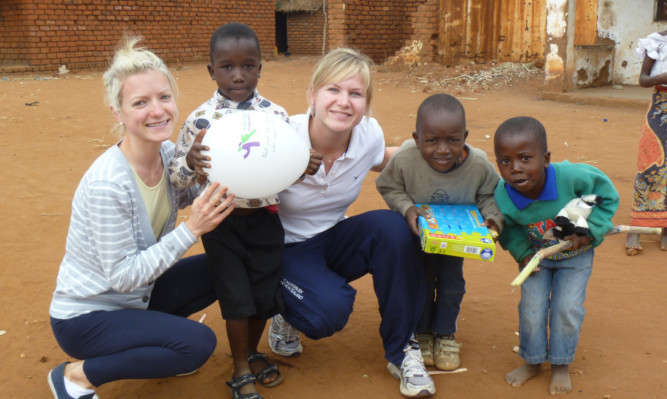Deborah and Kirstene Hair of Mains of Ardovie, Brechin, recently returned from Malawi, where they were taking part in a Young Farmers Exchange programme organised through the Royal Agricultural Society of the Commonwealth. In the second of two articles they write about their 15-day tour.
Our agricultural show day visit was a world away from our local shows.
Around 300 farmers arrived to register their produce (some of which had been bought from street vendors!) at around 5am, with judging taking place at 10am.
They were all invited for a rice and chicken lunch before the prizes were distributed.
Farmers then dispersed on their often very lengthy journeys home in the middle of the afternoon.
Entries included items such as legumes, fruit, vegetables and livestock.
However, due to lack of funding and, consequently, advertising shows struggle to attract significant attention and stature and therefore have a minimal impact on the industry.
A visit to a dairy cooperative reflected many of the problems we face back in the UK market in terms of low prices and the struggle with cheaper imports.
Set up in 1998, the scheme incorporated 230 farmers, each with approximately two cows.
The milk was brought from the farms to the depot, which produced around 2,000 litres per day.
Having visited a farm, the vets in our group were pleasantly surprised with the standard of the three cows, although there was room for improvement with regards to control of disease and general animal husbandry.
Impressively, there were controls in place to stop farmers adding to the milk to dilute it.
Although encouraging, throughout our various visits we found it equally frustrating to witness at first hand the difficulties facing the country which, if overcome, could greatly develop their potential output.
Infrastructure was a huge obstacle in terms of enticing external companies into the country as well as allowing Malawians to grow businesses which they already have in place.
The train lines, although in situ, are largely redundant, and buses left when they were full (as opposed to running to a timetable).
Many Malawians could not afford bikes never mind a car.
We also recognised that their failure to approach their farming plot, irrelevant of size, as a business had a detrimental impact on both yields and food security.
Many farmers would sell all their produce in order to reap the income, often without holding back enough to feed themselves and their families.
This lack of planning and entrepreneurial flair was a frustrating element to the trip as this ingrained cultural outlook was severely inhibiting many farmers’ chances of future prosperity.
Additionally, it was evident that the youth were not being sufficiently educated in alternative working practices, which unfortunately means they will simply follow their parents’ restricted footsteps.
Overall, the trip provided much food for thought in an agricultural aspect as much as a socio-cultural one.
Many of the visits were extremely promising, as not only were many Malawians taking advantage of the schemes which had been set up, along with the advice of their agricultural extension officer, but they were eager to hear from us and any ideas for development we could offer which was sometimes as simple as fixing their tomato plants to fences in order to encourage growth.
Equally, they too were forward-thinking in many ways such as building goat houses on stilts so that the manure dropped below to stop infection and could later be reused for fertiliser.
The government, although with limited resources, is actively looking at schemes to help farmers, although perhaps in a more reactive than proactive fashion.
Aid feeds into Malawi from various arms, although we quickly realised that where it had come in the form of a project or scheme it was considerably more beneficial than a drip of money which they became reliant on.
Funding is imperative for development.
However, increased business acumen, education, farming practice and infrastructure could also go a very long way in achieving a much brighter and more prosperous future for the farming industry in Malawi as well as boosting investment from external stakeholders.
One final note, putting facts, figures and our findings aside, a very noticeable characteristic which really hit home was the Malawians’ unrelenting and boundless happiness.
Their smile will remain a poignant memory of the trip.
It is a point we may choose to remind our father of following an inevitable rage the next time a part breaks off his combine!
